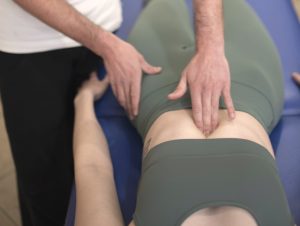In clinical practice it happens quite frequently to have to deal with people suffering from chronic back pain, that is back pain that has persisted to a greater or lesser extent for a long time. In most cases, the symptom presents itself with moments of very intense pain that can last from a few days to 4-6 weeks and then resolve spontaneously, leaving, however, a more or less constant pain or discomfort with a sensation of rigidity.
The type of person suffering from this disorder is often overweight, leads a sedentary lifestyle, a sedentary job and tends to eat in a disorderly and often very abundant way.
Normally he does not live outdoors and when he goes out it is to go to a bar to have an aperitif with friends or to go to a restaurant and sit down again to eat things that he could probably avoid.
During the first visit these people very frequently report that they have an Irritable colon or that they have suffered from constipation or swelling for a long time.
In their free time they rarely decide to take a long walk. More easily they are attracted to the sofa.
Until recently, this type of back pain in this type of people was essentially attributed to weight taking into account the purely mechanical aspect of the load to which the vertebrae are subjected.
In fact, this is partly the case; but it seems that it is not the only factor deriving from the belly that causes back pain.
In Eastern medicine, back pain has several causes with enigmatic and esoteric names, but which, if interpreted correctly, fit perfectly with what we find in Western medicine.
One of the causes recognized by Eastern Medicine is called Humidity; this concept refers both to the external climate that can worsen the perception of pain (studies on this have not reached satisfactory conclusions … The most plausible cause of pain that is accentuated with the variation of the weather seems to be an increased sensitivity of the baroreceptors joints that are used to perceive the pressure variations inside the joint (if too sensitive they can also be influenced by atmospheric pressure), and to the internal conditions of the organism that can mimic a humid climate.
Let me explain: the humidity of oriental medicine refers to everything that ferments excessively and is therefore not transformed in an adequate way. Moisture slows down and therefore tends to stiffen some parts of the body with which it comes into greater contact. The body organs that are related to humidity are those of digestion and in particular the Stomach and Pancreas (in addition to the Gallbladder in some cases) which manage, together with their meridians, intestinal function.
The places in our body where we can find a high fermentation activity are obviously the intestines which, thanks to the Microbiota and its work (fermentation), can transform food into constituents of our body.
When fermentation does not take place correctly, intestinal and digestive disorders occur which can lead to some dysfunctions such as Leaky Gut Syndrome. These dysfunctions significantly increase the presence of chronic low-grade inflammation which can lead to problems throughout the body and increase the occasions when we feel a spike in pain.
Furthermore, a very particular behavior of the microbiota has recently been discovered:
it can directly affect the pain and health of the intervertebral discs.
In accordance with today’s evidence, the microbiome can be an important factor in the induction or aggravation of Intervertebral Disc Disorders (IDD) through the change or regulation of the internal and external environment of the Intervertebral Disc.
There are 3 mechanisms that can induce Chronic Lower Back pain and disc changes:
Bacteria can transfer from the intestine through the epithelium barrier in the intervertebral disc
Regulation of the systemic immune system and mucous membranes (Inflammatory Cytokines, etc.)
regulation of nutrient absorption and metabolite formation in the intestinal epithelium and its diffusion into the intervertebral disc.
Furthermore, to investigate whether the disc problem is initiated by pathogenic bacteria and to establish the correlation between the presence of certain microbial groups with the disease in question, the diversity analysis can be used to characterize the stool / blood microbiota of patients with Discopathy.
Future studies on microbiome, fungi and viruses in Discopathies are needed to revolutionize our thinking about their possible role in the development of these diseases.
Furthermore, the researchers believe that the inhibition of systemic inflammation and the interruption of inflammatory cascades that can alter the Disc, can occur by targeting the gut and the microbiome in order to intervene more completely at the root of Chronic Back Pain. .
It therefore becomes essential, if we want to solve the problem definitively, modifying the lifestyle that we know can influence the composition of the microbiome. Physical activity, correct exposure to the sun and a correct diet based on natural and not excessively refined products can greatly improve the conditions of the Microbiome and consequently back problems.
To help change your lifestyle, we can intervene with some effective tools including moxibustion:
Oriental medicine has always successfully treated moisture in the body thanks to Moxibustion which consists in the application of heat to specific points and areas of our body to modulate the activity of the Autonomous Nervous system in order to help the intestines to function better.
A study published in the World Journal Of Gastroenterology in 2018 showed
That moxibustion can significantly reduce colonic tissue damage and levels of pro-inflammatory cytokines and anti-inflammatory cytokines in rats with 4% sodium dextran sulfate-induced ulcerative colitis, relieve intestinal inflammation, and promote restoration of altered colonic tissue. Furthermore, moxibustion can increase the diversity of the gut microbiome.


